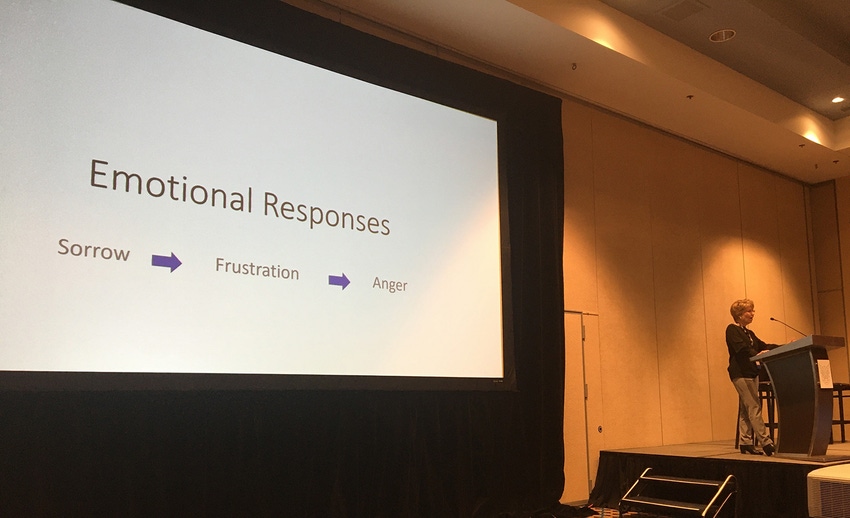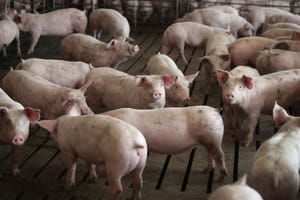Smithfield veterinarian says you can't prevent every disease outbreak, but can listen, let people know you care.

2013 was a year Mary Battrell would just soon not have to relive. In the spring of 2013, millions of piglets across the country were killed by a particularly virulent strain of porcine epidemic diarrhea virus that poses no risk to humans but is nearly always fatal in very young pigs.
“Tears were not uncommon,” Battrell says. “Several farm employees took it very hard, particularly our team members who work in the farrowing house. They care deeply about those baby pigs.”
It was July 10, 2013 when the first sow farm in the Smithfield Foods pork production system broke. The 4,000-head farrow-to-wean North Carolina contract farm noticed a couple litters were scouring, a few pigs were vomiting and some sows were off feed that Monday morning. By noon, the entire room was affected. By the next morning, it had spread across the entire barn.
"I had really never seen disease move as quickly as this one," Battrell says. "There was no denying it. We had PED."
The staff veterinarian who has been with Smithfield for more than 20 years and has worked through power failures, lightning strikes, hurricanes and several other disease challenges, told attendees at the 2019 Pig Welfare Symposium in Minneapolis last week, the PED break still weighs heavy on her mind. It was an event that triggered a tremendous emotional response throughout the Smithfield production system and spilled into the communities where their employees and contract partners reside. The local doctor reported seeing more patients from the industry for stress, anxiety and sleep deprivation. PED was a topic of conversation at the grocery store and at church.
While getting rid of the disease was a challenge, supporting their staff during that time was even more critical, Battrell says.
"About 80% of success in pork production is really about the people. We all got into this business because we love animals, but our people, it is every bit as much about them," Battrell says. "The success or failure at a farm, from day-to-day events to a disease or disaster situation, is about keeping people focused, positive and motivated. Pigs are actually pretty easy, and diseases will come and go, but you really need that workforce and that team of people to see it through."
Her response during a disaster like this, right or wrong, Battrell says is to let those caregivers know you heard them, understand how they feel and are sorry it has happened; that you care about them, the pigs and their business; and are going to do all you can to help them get through this.
Battrell says it's also important to focus on the recovery. Share the plan with the farm staff on how to get back on track, explain what you are going to do, why you are doing it and give them a written copy of the plan. Assign them specific tasks from the day the farm breaks and the days that follow and keep them busy working on recovery.
"One of the greatest frustrations is when people feel like they can’t make a difference or solve a problem,” Battrell says. "People need to understand that although it’s too late to prevent the break, there are things they can do to shorten the recovery period."
Finally, Battrell says explain the timeline for improvement, what should they see Day 3, in three weeks, in 12 weeks, etc. Let them know every day is going to be a little bit better than the day before and never use the words "there is nothing you can do about it." "People need hope," Battrell says.
During a disaster like this, it's also important to recognize those employees who are distraught and send them home. While Smithfield has an employee assistance program that offers employees and their dependent family members access to mental health resources and licensed psychologists, Battrell says she did gather contact information for other professionals that could help their contract growers in case it was needed.
While a disease outbreak can be a good time to investigate the potential cause of how that disease entered the farm, Battrell says it is not the time to point fingers or lay blame.
"Sometimes when you start questioning people about how it got there, they feel like you're beating them up, so you have to do that cautiously," Battrell says.
After the initial sorrow, Battrell says she saw frustration and anger from pork producers during the outbreak.
"The goal has always been to wean more quality pigs, now we are telling them to humanely euthanize young piglets, as soon as they start to scour, before they start to scour and then every pig at birth for the next three weeks until the sows build sufficient immunity," Battrell says.
There was also anger, Battrell says. Producers questioned how PED entered the United States, why there wasn't a vaccine or treatment yet, why some sites were still having issues after Week 12 and when pigs could be expected to flow again down to the grow-finish. Producers were concerned about their financial loss, and their ability to make payroll and pay their bills.
It's important to remember during a disaster people behave differently, Battrell says, and to be patient with them.
"You can't prevent every disease outbreak, solve every problem, save every pig, make every producer profitable and you are certainly not going to make everyone happy, and that's a horrible lesson to learn," Battrell says. "What you can do is listen to people and try to learn, teach, coach, lead your people through it, show them that you care. It's also very important that you take care of yourself. You need to know when it's time for you to step away."
About the Author(s)
You May Also Like





